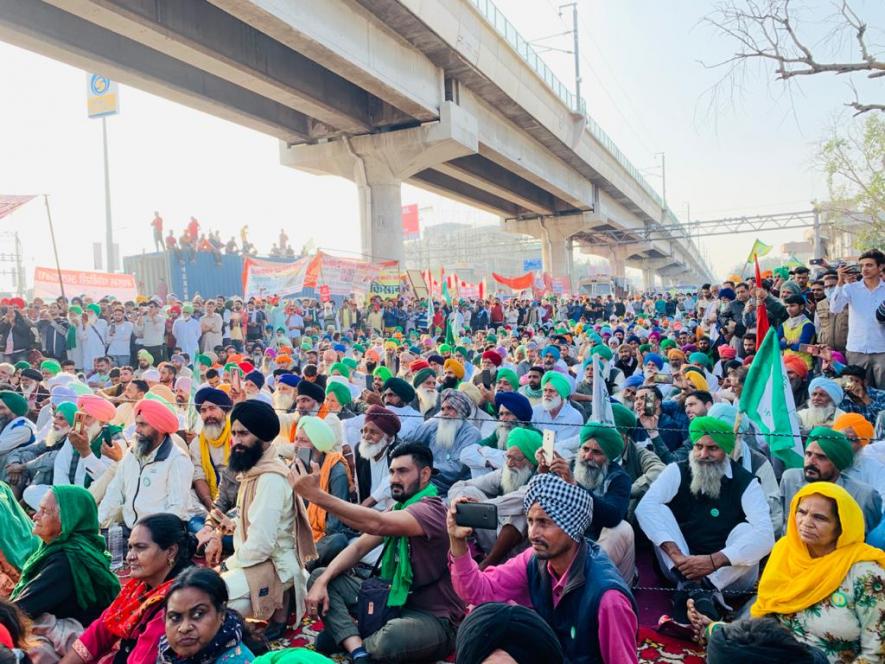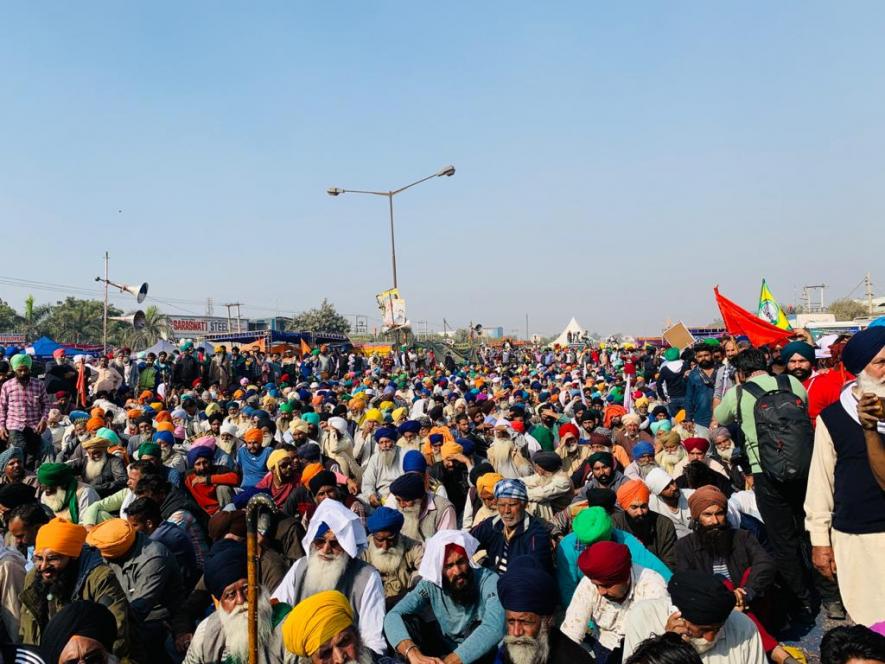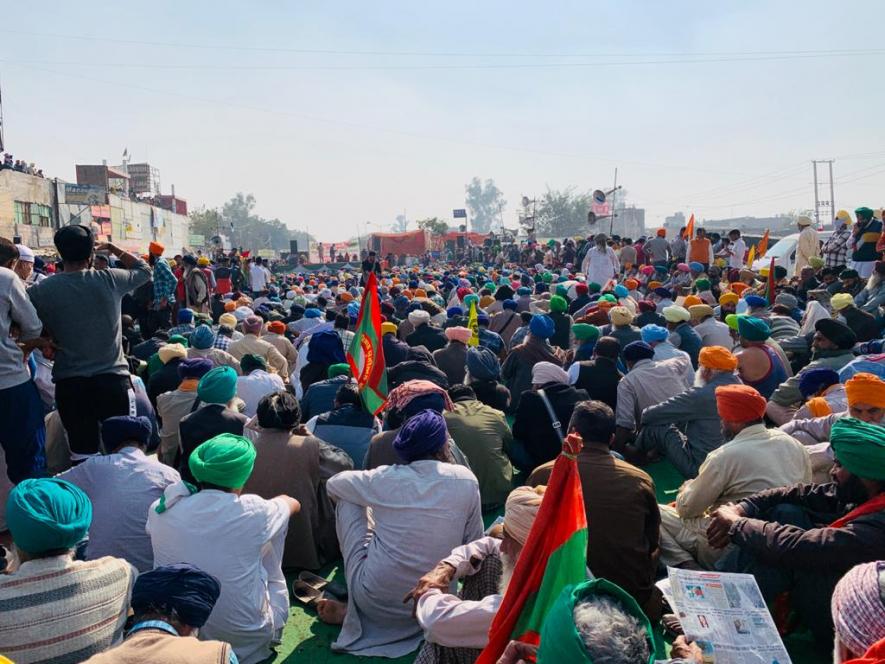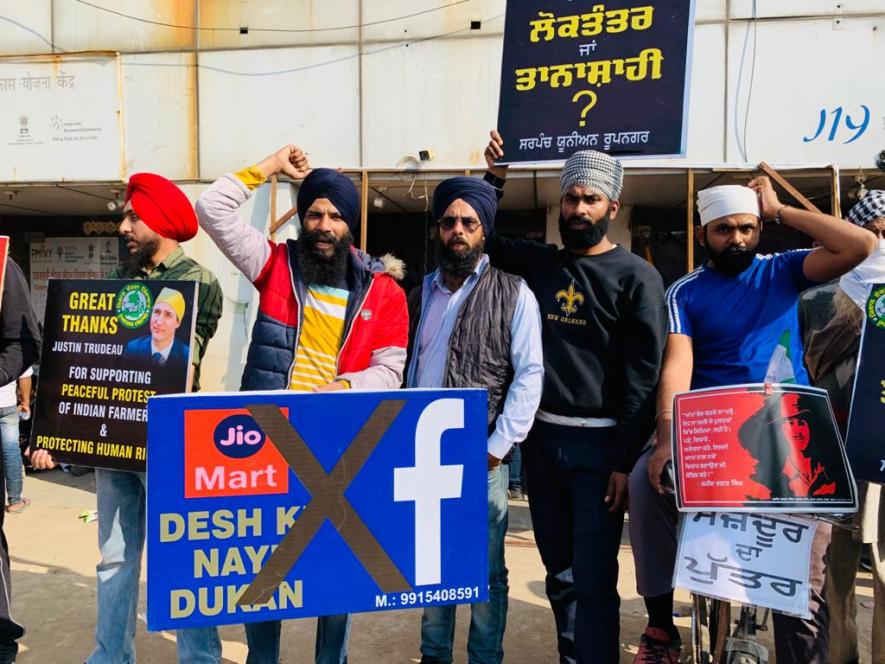Farmers’ Stir Echoes in Delhi: Will Government Blink?

Bharat Bandh makes its mark. At the Singhu Border protest site a great amassing of farmers from Punjab, Haryana, Uttar Pradesh and Rajasthan took place on Tuesday, their celebratory mood filling the dusty air with song and music. And in the evening, as the farmers rejoiced in their opposition to the three new farm bills came the news: the Modi government has blinked. Realising that the tremors of this protest could develop into a quake, it has called farmers’ representatives for a surprise negotiation on Tuesday evening.
That the government may be beating the retreat was signalled by the fact that it is Home Minister Amit Shah who would meet the protesting farmers, that too hours before a scheduled discussion of farmers with other Union Ministers. Those meetings had all drawn a blank. Again, Tuesday’s round of talks does not mean that the farmers believe their work here is done. “It is not for nothing that we came prepared with six months rations,” says Dinesh Sharma, a farmer from Uchana in Haryana who has come to Singhu border with a group of farmers. “Everything this government does is aimed to divide people, so we will not budge until the three laws are formally over and done with,” he says.

The Bharat Bandh, or all-India shutdown, gathered great momentum as support poured in from farmers’ groups and workers’ unions across the country. Children and young adults seemed charged and restless, while the elders huddled into groups, discussing the future. Nearly two weeks in, this protest has unified all kinds of workers behind three basic rallying points: government support to the mandi system and MSP and repealing the three new laws. As speaker after speaker clambered on to the stage that has been put up at the Singhu protest site to address the gathering of thousands, all of them reiterated these two points throughout the morning of 8 December.
Against Modi, Corporate Rule and ‘Adani-Ambani’
Varinder Singh, a farmer from Kaithal in Haryana and member of Naujawan Bharat Sabha says the government has already been offering farmers “a guarantee of MSP”, but that does not wash with the farmers unless the laws are entirely withdrawn. “We know we will win—it is the government which is on the back foot, not us. It is the government chasing us to talk, not we chasing them,” he says, rather presciently, just hours before the government invited farmers representatives to a fresh round of discussion.
The problem with the guaranteed-MSP idea of the government is that the three ordinances that were turned into laws do not even mention MSP. Therefore, private companies are still free to buy from farmers, and that too at lower rates. Hence, purchases made through the mandi system will go down. “And if government purchases fall, the authorities will find an excuse to shut down the mandi system by claiming losses,” Varinder says.
The devaluation of mandis is inherent in the new laws, and therefore, so is the fall in farmers’ returns. For this situation, the farmers hold “Modi and large corporations” responsible and as a result “Ambani-Adani” has become a catch-phrase at Singhu border. The names of these two companies are now synonymous with corporate control over farmers and rural India—even young children at the protest site are going around, chanting against the two companies.
Kulbeer Singh Badal, a teacher in a college in Patiala, who has come to attend the protest in solidarity with the farmers, explains that earlier, anti-liberalisation protests used to be held and the catch-phrase then was “Tata-Birla”. “Today Adani and Ambani have become the hold-all phrases. People can relate to such phrases and the media is echoing them too,” Badal says.
This idea of corporate takeover, exemplified by two of India’s most powerful conglomerates, has become a major rallying point for the farmers. Every speaker who gets on the stage warns farmers that whether big or small, if companies take over agriculture and the mandi system, they will start dictating what price they can sell their crops at.
“We have a problem with Adani and Ambani because they are so big,” says Kamal Preet Singh, a farmer from Amritsar. “They control every sector of the economy, and they have joined hands with the Modi government. Even the media belongs to Adani-Ambani,” he says.

Such fears are arising from their experiences. Even before the three laws were passed in September, the declared MSP is often not what farmers were paid. “If the government could not guarantee us good prices, how will companies do it? If the government cannot run a mandi then the private sector certainly cannot,” says Dr Indrajeet Singh, an advocate from Patiala who is also at the protest site in solidarity with farmers.
“If the government offers farmers Rs,1,800 or so as MSP, but we do not get it, and end up selling at Rs.1,200 or less, then if they make mandis private, the Adanis and Ambanis will buy at Rs.1,200 and prices will crash in states other than Punjab and Haryana too. Farmers will be left with nothing,” says Rajinder Singh from Nawanshahr, Punjab. He says that even the sacks in which crops are stored are “marked with the ‘Reliance’ logo”. This troubles him, for it implies that one or two companies are in a position to control large tracts of agricultural land, godowns, transport, even trains and mandi trade? “Now these companies also want to become farmers. Why can they not excel at just one thing instead of everything?” Varinder asks.
National benefit
As the protests expand, drawing thousands of new supporters every day, the demands of the farmers are also getting more ambitious. They always said their demands are not just limited to Haryana or Punjab’s farmers, that they want a host of problems in agriculture addressed, which were not national talking points until September. “We want MSP strictly implemented in all states,” says Kuldeep Singh from Doaba Kisan Union, Punjab. He pooh-poohs the claim that only those farmers are paid less than the MSP whose produce is not graded as high-quality. “At the mandi, traders say demand ‘dry corn’, but the corn is dried on racks at the mandi, which are so poorly organised that our crops get mixed-up with each others’. That is how quality falls and payments dip,” Kuldeep says.
To fix this problem, farmers say, now non-mandi states also want laws to protect their mandi systems and MSP, and they are demanding infrastructure upgrades at the existing mandis too. “By uniting farmers of the entire country, all farmers will benefit, not just in Punjab and Haryana,” says Amrit Pal, a farmer from Patiala, Punjab. “If there is a mandi everywhere farmers will benefit everywhere.”
On the other hand, privatisation will increase blackmarketing, while stockists will benefit at the cost of consumers. Food will become an explosive subject, and to avoid this, any crop should be sold at MSP, they say.
Accordingly, farmers from Uttar Pradesh have started showing up in numbers at the Singhu border and reportedly at other sites too. They have come in solidarity and to raise their own demands. They do not think the ongoing protests are raising issues specific to Punjab or Haryana. For example, they say they have been selling their rice for such low prices that landlords in Uttar Pradesh who have small holdings often go to Punjab to labour in the fields. Some sell their grain to traders who bring it to Punjab, where the prices are higher because the state’s “open procurement” system still works. “This is all happening because the farmers of Uttar Pradesh do not get the MSP they need to break even,” says Rajesh Pathak, a farmer from Hathras. He raises a simple question: why force farmers to do what they do not want to? “When we are all saying do not like these new laws, the government should let go of them. The government should display towards us the same generosity we have shown towards it by voting for it,” he says.
On-stage: Modi Aunda kyu nahi?
From the stage set up at the Singhu border venue, Prime Minister Narendra Modi’s name is called out repeatedly. Speaker after speaker—each gets two minutes to speak on a farm-related topic—says the Modi government is “fooling the country” and that is why for the meeting scheduled for Wednesday, 9 December, farmers have already decided to adopt a rather stern attitude. “We simply expect a ‘yes’ or ‘no’ answer from the government. We will only listen, not talk, and there will be no ‘debate’ this time. If we don’t get confirmation that the laws stand repealed, our leaders will get up and walk out,” says Kuldeep Singh of the Doaba Kisan Union.
The farmers organised a country-wide bandh to draw Indian and global attention, which they have got. “When the world will read about what is going on in India, the government will be shamed. They will see that people imposed a Bharat Bandh because the government is not listening to the farmers,” says Mahavir Lamba, a farmer from Kaithal. “Even if a Congress party government had been in power, we would have protested in this very way,” says he.

This is what makes the ongoing discussions with the Home Minister important. There is a buzz that the “guaranteed MSP” promise is a way to lure bigger farmers into leaving the joint struggle, leaving the smaller farmers isolated. “But we will not be divided,” echo farmers, big or small and whichever state they may have come from. In fact, they thank Modi for one thing—the success of their movement. “He made us forget our differences and see developments as farmers,” says Dinesh Sharma from Uchana. He adds, “This we could not have done on our own, as we were always victims of his party’s divide and rule.
Get the latest reports & analysis with people's perspective on Protests, movements & deep analytical videos, discussions of the current affairs in your Telegram app. Subscribe to NewsClick's Telegram channel & get Real-Time updates on stories, as they get published on our website.























